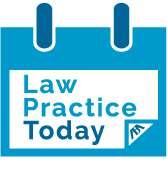LPT: The Ethics Issue

ABA’s Law Practice Today
Ethical issues and dilemmas hit the legal profession from all angles. In serving as issue editor for the September 2018 edition of the ABA’s Law Practice Today (LPT) webzine, I sought to address a wide variety of subjects from attorneys with different practices and backgrounds.
Of course, I authored my own piece, What Do the Revised Rules for Lawyer Advertising Mean for Me?, recapping the recently adopted Resolution 101, passed by the House of Delegates at the ABA Annual Meeting in Chicago this past August. These suggested amendments to the Model Rules (7.1 through 7.5) relate to the realities of today’s lawyer advertising. While change is long overdue, it will be interesting to see the true impact that they may or may not have on state bar regulations and subsequent enforcement.
To truly realize the fierce competition and crazy approaches that some law firms have resorted to, read my perspective in The American Lawyer’s story, Online Search Disputes Mark New Front in Consumer-Focused Firm Rivalries, reported on by Scott Flaherty earlier this month. Focusing on a pair of recent lawsuits alleging law firm manipulated search engine results, Flaherty discusses Motta & Motta’s dispute with Dolci & Weiland in Illinois, and the battle in my own Southern New Jersey backyard between Hark & Hark and Helmer, Conley & Kasselman. It’s a digital age “wild west” out there folks, and you’d be amazed at the lengths some firms (usually in consumer-driven practices) will go to in a marketplace that is far different than what many veteran attorneys are used to. Changing up the model rules is long overdue and certainly needed. As an ethics attorney and a law marketer, I often find myself wading through foggy gray areas to make sure I’m putting my law firms in the best possible position to win, while staying within the ethical boundaries that some states care about and others do not.
But the LPT ethics issue goes well beyond my area of concentration in law marketing ethics. It hits a variety of timely and useful subjects that impact so many of us in the legal profession.
Michael Downey and Paige Tungate of the Downey Law Group, a law firm devoted to legal ethics, write on Practice Advice on Privilege Logs. Like me, Mike is a past chair of the ABA Law Practice Division. We’ve had dozens of legal ethics conversations over the years and he knows what subject matters hit home for attorneys these days, choosing to focus on issues relating to a task most of us like to avoid, the proper creation of privilege logs.
In another of my ABA roles, as Chair of the Standing Committee on Continuing Legal Education (SCOCLE), I have the opportunity to see every one of the hundreds of ABA CLE programs that are put on by the association’s entities. It was there that I was intrigued by the background of Dr. Alex Yufik, a licensed attorney and a board certified forensic psychologist, which led me to reach out and get an outstanding ethics piece on Evaluating an Impaired Attorney’s Fitness to Practice.
I’ve crossed speaker/presenter paths often with Pennsylvania ethics lawyer Dan Siegel, who uses a recent pro sports controversy as the jumping off point for A Real-Life Metaphor for a Lawyer’s Ethical Nightmare. In a story close to my heart, as a Philadelphia 76ers fan, he relays the downfall of general manager Bryan Colangelo, now better known for the Twitter “burner accounts” that his wife used to comment on things that, well, she should not have. Not to mention sinking her husband’s career. Information—sometimes TMI—can be a dangerous thing that quickly becomes incendiary. Confidential information is just that—although how many spouses ignore it at the expense of marital privilege?
Kristin Tyler of LAWCLERK and technology lawyer Dan Lear offer up Five Tips for Using Freelance Attorneys. More and more law firms and corporations are utilizing freelancers for legal work. At the same time, more and more lawyers like the idea of being freelancers, rather than tied down to a traditional job. This brings all sorts of potential ethic issues to the forefront—here are a few tips for what to look for.
 Marketing Attorney Blog
Marketing Attorney Blog

